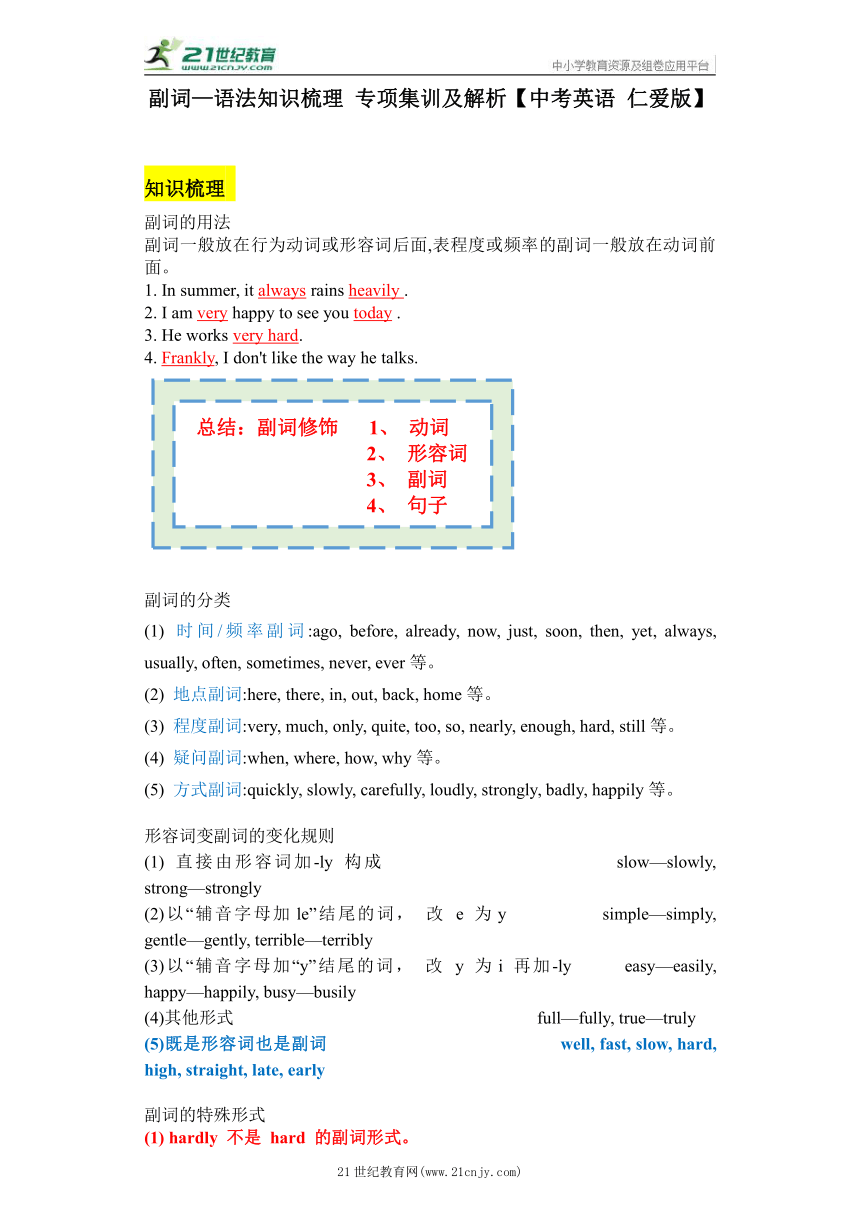
副词—语法知识梳理 专项集训及解析【中考英语 仁爱版】 知识梳理 副词的用法 副词一般放在行为动词或形容词后面,表程度或频率的副词一般放在动词前面。 1. In summer, it always rains heavily . 2. I am very happy to see you today . 3. He works very hard. 4. Frankly, I don't like the way he talks. 总结:副词修饰 1、 动词 形容词 副词 句子 副词的分类 (1) 时间/频率副词:ago, before, already, now, just, soon, then, yet, always, usually, often, sometimes, never, ever等。 (2) 地点副词:here, there, in, out, back, home等。 (3) 程度副词:very, much, only, quite, too, so, nearly, enough, hard, still等。 (4) 疑问副词:when, where, how, why等。 (5) 方式副词:quickly, slowly, carefully, loudly, strongly, badly, happily等。 形容词变副词的变化规则 (1) 直接由形容词加-ly 构成 slow—slowly, strong—strongly (2)以“辅音字母加le”结尾的词, 改 e 为y simple—simply, gentle—gently, terrible—terribly (3)以“辅音字母加“y”结尾的词, 改 y 为i 再加-ly easy—easily, happy—happily, busy—busily (4)其他形式 full—fully, true—truly (5)既是形容词也是副词 well, fast, slow, hard, high, straight, late, early 副词的特殊形式 (1) hardly 不是 hard 的副词形式。 (2)像副词的形容词:friendly, lonely, lovely, likely, daily, lively, ugly... (3) well 可作形容词, 意为“健康的,身体好的”; 也可作副词, 意为“好地” 辨析 1、辨析:too、either、as well、also too 肯定句句尾 too前面一般有一个逗号和前面句子隔开 also 肯定句句中 Be动词、情态动词之后,实义动词之前 as well 肯定句句尾 比too更正式一点 either 否定句句尾 用逗号与前句隔开,也可以不隔开 eg:I’m in Row 1, too . Chinese take-away food is also popular. We don’t like the same colors, either . 2、辨析:already,yet, still already 意为“已经”, 通常用于肯定句; yet 意为“尚”“仍然”,常用于否定句和疑问句; still 表示“仍然,还”,放于句中。 3、辨析 sometimes 指“有时,偶尔” = from time to time sometime 指“将来或过去的某个时候” some time 指“一段时间” some times 指“几次,几倍” 4、辨析so , such so adv. “如此”,修饰形容词, 如:so fast. such adj. “如此”,修饰名词, 如:such a good boy. 注意:①如此以至于 so +adj./adv. + that.... ... so beautiful that... such+ a/an+adj.+可数名词单数+that... such+ adj.+可数名词复数/不可数名词+that... such a beautiful boy that.. ②so many/much √ 没有such many/much × 5、辨析much too, too much, too many too much +不可数名词, 表示“太多” too many +可数名词复数, 表示“太多” much too + adj. /adv. 原级, 表示“非常,极其,太……” 没有many too 6、 how long 多久,对一个持续的时间段提问,常用“for+时间段”或“ since+时间点”回答。也可问事物的长度。 -How long have you been in China? -For three months how soon 多久,用于一般将来时的句子中,常用“in+时间段”回答 -How soon will he come back -In five minutes. how often 对频率提问,常用once/twice a week , three/four... times a week等回答 -How often do you visit your grandparents -Twice a week. how far 多远,对距离提问 -How far is it from your home to your school -About two kilometers. 专项集训 一、单项选择 1.Jane works hard but she doesn’t work _____ Mary. A.less hard than B.as goo ... ...
~~ 您好,已阅读到文档的结尾了 ~~

